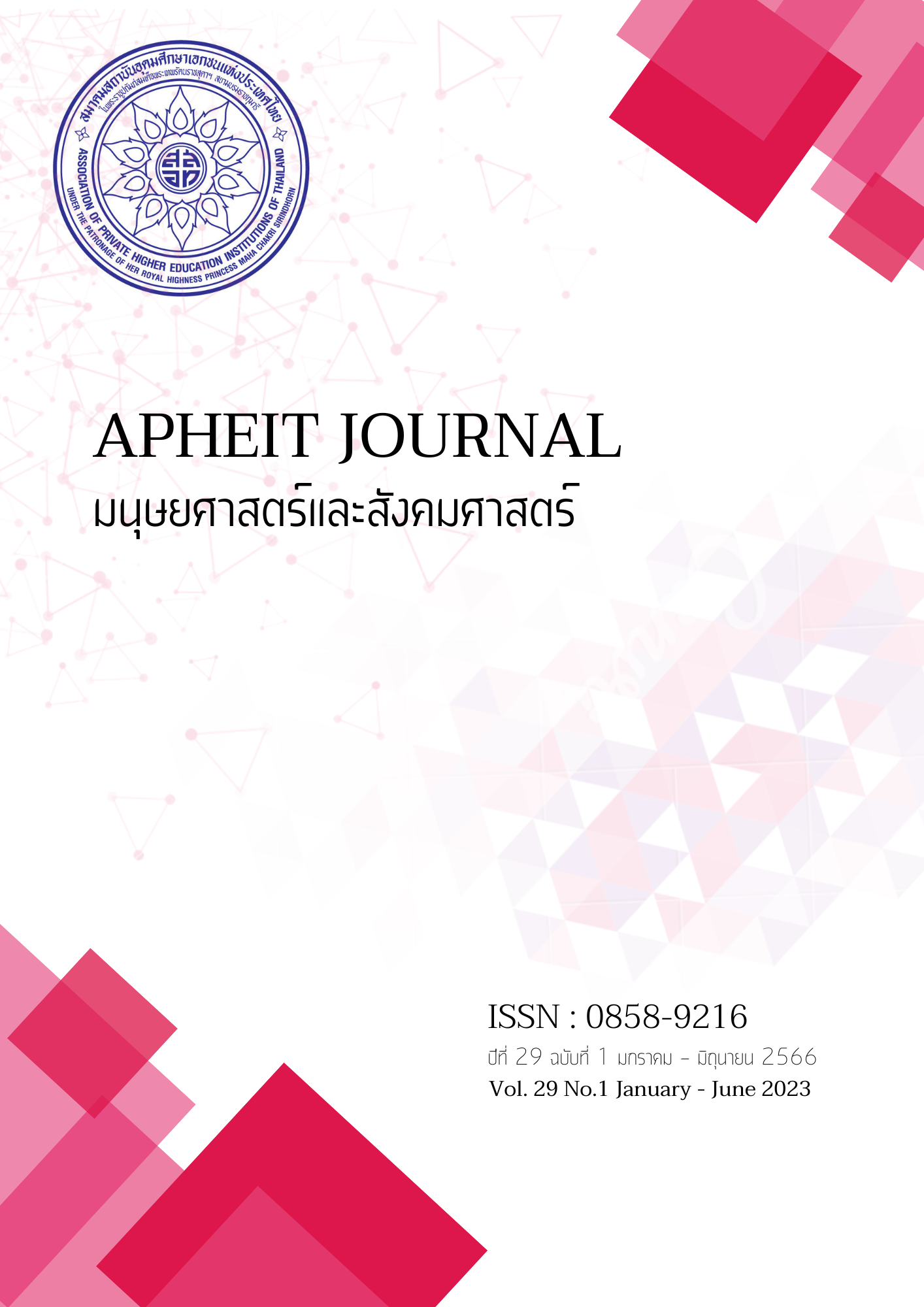The Effects of Practicing the Game of Go on Executive Functions: A Case Study of First-year Students from the Faculty of Education, Nakhon Ratchasima Rajabhat University
คำสำคัญ:
Practicing the game of go, Executive Functions, Student developmentบทคัดย่อ
This research was an experimental study aiming at: 1) comparing the executive functions of students in the experimental group and the control group before and after the experiment 2) comparing the Executive functions after the experiment between the experimental group and the control group. The study used a sample group of 20 students from the Faculty of Education, first-year undergraduate level, in the second semester of the 2023 academic year at Rajabhat Nakhon Ratchasima University, Nakhon Ratchasima province. The sample group was divided into an experimental group of 10 students and a control group of 10 students, selected from a total of 687 students. Instruments used in the experiment were the Practicing of the Game of Go Program. The practicing plan covered a total of 11 times, with each activity lasting 2 hours. In total, the training lasted for 22 hours, and the questionnaire of Executive functions consisted of 20 items with a reliability of .913. Statistics used for data analysis were mean, standard deviation, and t-test. The results showed that: 1) After, the experiment, the students in the experimental group demonstrated significantly higher levels of Executive functions compared to before the experiment, with a statistical significance level of .01. There were significant changes in 4 aspects, including attention, planning, cognitive flexibility, and self-monitoring. The aspect that did not show significant change was inhibition. 2) After, the experimental group students had Executive functions score higher than the control group with statistically significant at .01 level.
เอกสารอ้างอิง
ดวงกมล สวนทอง. (2556). การวิจัยและพัฒนารูปแบบการสอนแบบสแกฟโฟลด์ที่ส่งเสริมจิตลักษณะฉันทะ
และความสามารถในการเขียนบทความเชิงวิชาการของนักศึกษาสถาบันการพลศึกษา วิทยาเขต เพชรบูรณ์ [ปริญญานิพนธ์ดุษฎีบัณฑิต] มหาวิทยาลัยศรีนครินทรวิโรฒ.
ดาริกา ดวงบุ. (2564). การสร้างแบบวัดทักษะการคิดเชิงบริหาร (EF) ด้านทักษะพื้นฐานสำหรับ นักเรียนชั้น ประถมศึกษาปีที่ 6 ในจังหวัดนครพนม [ปริญญานิพนธ์มหาบัณฑิต] มหาวิทยาลัยมหาสารคาม.
ธนพล เตียวัฒนานนท์. (2563). ความสัมพันธ์ของการเรียนหมากล้อมกับผลการเรียนวิชาหลัก [สารนิพนธ์ มหาบัณฑิต] มหาวิทยาลัยธุรกิจบัณฑิตย์.
นวลจันทร์ จุฑาภักดีกุล, ปนัดดา ธนเศรษฐกร, และรพิน เลิศอาวัสดา. (2560). การประเมินพัฒนาการด้านการคิดเชิงบริหาร (EF) ในเด็กปฐมวัย. การประชุมวิชาการการพยาบาลกุมารเวชศาสตร์ครั้งที่ 29 กรุงเทพฯ: สถาบันวิจัยระบบสาธารณสุข
นวลจันทร์ จุฑาภักดีกุล. (2555). การศึกษาและประเมินรูปแบบการเรียนรู้ที่ส่งเสริมการคิดเชิงบริหารใน เด็กไทย. กรุงเทพ: มหาวิทยาลัยมหิดล.
ประยุทธ ไทยธานี. (2560). ประสบการณ์ความเครียดที่สัมพันธ์กับการทำหน้าที่บริหารในสมองบกพร่องของ นักศึกษาปริญญาตรี. นครราชสีมา: มหาวิทยาลัยราชภัฏนครราชสีมา
พชรภรณ์ เชียงสิน. (2552). ประสบการณ์การเล่นหมากล้อมและจิตลักษณะที่เกี่ยวข้องกับความฉลาดในการเผชิญปัญหาและฟันฝ่าอุปสรรคของนักเรียนชั้นมัธยมศึกษาตอนต้น [วิทยานิพนธ์มหาบัณฑิต] มหาวิทยาลัยศรีนครินทรวิโรฒ.
มติ ทาเจริญศักดิ์. (2560). กระบวนการถ่ายทอดทางสังคมในการเล่นหมากล้อมและผลของการเล่นหมากล้อมต่อการพัฒนาการแก้ปัญหาอย่างสร้างสรรค์. [วิทยานิพนธ์ดุษฎีบัณฑิต] มหาวิทยาลัยศรีนครินทรวิโรฒ.
ลภณ จิรโศภิน. (2562). วิเคราะห์ศาสตร์การบริหารจัดการผ่านทักษะทางปัญญา 11 ประการของหมากล้อม. บทความวิชาการสมาคมสถาบันอุดมศึกษาเอกชนแห่งประเทศไทย, 25(2), 78-93.
สุภาวดี หาญเมธี. (2559). 3 ทศวรรษ ที่สุดของการทำงาน ของด้านทักษะ EF. กรุงเทพฯ: จัดทำโดย บริษัท รักลูกกรุ๊ป จำกัด.
Anderson, V. (2002). Executive function in children: Introduction. Child Neuropsychology, 8, 69-70.
Andrew Edward Finch. (2007). Baduk and Second Language Learning; Effortful study and Balanced Flow (Kyungpook National University).
Diamond, A., et al. (2007). The Early Years: Preschool Program Improves Cognitive Control. Science, 318, p. 1387-1388. https://doi.org/10.1126/science.1151148
Earl K. Miller and Jonathan D. Cohen (2001) An Integrative Theory of Prefrontal cortex Function. Annual Review of Neuroscience.
Greene, R. W. (2009). Lost At School: Why Our Kids With Behavioural Challenges Are Falling Through The Cracks & How We Can Help Them. New York: Scribner.
Kim, S. H., Lee, Y. S., Kim, N. N., Cheong, J. H., & Han, S. H. (2014). Baduk (the Game of Go) improved cognitive function and brain activity in children with attention deficit hyperactivity disorder. Psychiatry Investigation, 11(2), 143.
doi: 10.4306/pi.2014.11.2.143
Lin, Q., Cao, Y., & Gao, J. (2015). The impacts of a Go-game (Chinese chess) intervention on Alzheimere disease in a Northeast Chinese population. Frontiers in Aging Neuroscience, 7, 163. doi: 10.3389/fnagi.2015.00163
Mei Wang. (2021). Effects of playing Go for education and psychological treatment. University of Trier, Research Cluster “Cultures in Transitions in East Asia and Europe”, Universitätsring 15, 54296 Trier, Germany: Vol. XI (LXXIII) No. 2/2021.
Parson, R. (2001). An investigation into instruction available on the world wide web. Retrieved July 15, 2021, from http://wwww.osie.on.ca_/rparson/out1d.htm
Roehler, C.V. and Cantlon, S.J. (1996). Scaffolding secondary student reading and studying of science and math textbooks. Retrieved July 20, 2021.
Thorell, L. B., Lindqvist, S., Nutley, B. S., Bohlin, G. and Klingberg, T. (2009). Training and transfer effects of executive functions in preschool children. Developmental Science, 12(1), 106-113.
ดาวน์โหลด
เผยแพร่แล้ว
รูปแบบการอ้างอิง
ฉบับ
ประเภทบทความ
สัญญาอนุญาต
ลิขสิทธิ์ (c) 2023 Chanapat Apichartkriangkrai

อนุญาตภายใต้เงื่อนไข Creative Commons Attribution-NonCommercial-NoDerivatives 4.0 International License.





